Categories
Archives

Here is a wrap-up of IPTC has been up to in 2022, covering our latest work, including updates to most of our key standards.
Two successful member meetings and five member webinars
This year we again held our member meetings online, in May and October. We had over 70 registered attendees each time, from over 40 organisations, which is well over half of our member organisations so it shows that the virtual format works well.
This year we had guests from United Robots, Kairntech, EDRLab, Axate, HAND Identity, RealityDefender.ai, synthetic media consultant Henrik de Gyor and metaverse expert Toby Allen, as well as member presentations from The New York Times, Agence France-Presse, Refinitiv (an LSE Group company), DATAGROUP Consulting, TT Sweden, iMatrics and more. And that’s not even counting our regular Working Group presentations! So we had a very busy three days in May and October.
We also had some very interesting members-only webinars including a deep dive into ninjs 2.0, JournalList and the trust.txt protocol, a joint webinar with the EBU on how Wikidata and IPTC Media Topics can be used together, and a great behind the scenes question-and-answer session with a product manager from Wikidata itself.
Recordings of all presentations and webinars are available to IPTC members in the Members-Only Zone.
A fascinating Photo Metadata Conference
This year’s IPTC Photo Metadata Conference was held online in November and we had over 150 registrants and 19 speakers from Microsoft, CBC Radio Canada, BBC, Adobe, Content Authenticity Initiative, the Smithsonian and more. The general theme was bringing the IPTC Photo Metadata Standard to the real world, focussing on adoption of the recently-introduced accessibility properties, looking at adoption and interoperability between different software tools, including a new comparison tool that we have introduced; use of C2PA and Content Authenticity in newsroom workflows, with demos from the BBC and CBC (with Microsoft Azure).
We also had an interesting session discussing the future of AI-generated images and how metadata could help to identify which images are synthetic, the directions and algorithms used to create them, and whether or not the models were trained on copyrighted images.
Recordings of all sessions are available online.
Presentations at other conferences, work with other organisations
IPTC was represented at the CEPIC Congress in Spain, the DigiTIPS conference run by imaging.org, the Sports Video Group’s content management group, and several Project Origin events.
Our work with C2PA is progressing well. As of version 1.2 of the C2PA Specification, assertions can now include any property from IPTC Photo Metadata Standard and/or IPTC Video Metadata Hub. C2PA support is growing in tools and is now available in Adobe Photoshop.
IPTC is also working with Project Origin on enabling C2PA in the news industry.
We had an IPTC member meet-up at the NAB Show in Las Vegas in May.
We also meet regularly with Google, schema.org, CIPA (the camera-makers behind the Exif standard), ISO, CEPIC and more.
Standard and Working Group updates
- Our IPTC NewsCodes vocabularies had regular updates each quarter, including 12 new terms at least 20 retired terms. See the details in our news posts about the September Update, July Update, May Update, and the February Update (in time for the Winter Olympics). We also extended the Digital Source Type vocabulary specifically to address “synthetic media” or AI-generated content.
- The News in JSON Working Group released ninjs 1.4, a parallel release for those who can’t upgrade to ninjs 2.0 which was released in 2021. We published a case study showing how Alamy uses ninjs 2.0 for its content API.
- NewsML-G2 v2.31 includes support for financial instruments without the need to attach them to organisations.
- Photo Metadata Standard 2022.1 includes a Contributor structure aligned with Video Metadata Hub which can handle people who worked on a photograph but did not press the shutter, such as make-up artists, stylists or set designers;
- The Sports Content Working Group is working on the IPTC Sport Schema, which is pre-release but we are showing it to various stakeholders before a wider release for feedback. If you are interested, please let me know!
- Video Metadata Hub 1.4 includes new properties for accessibility, content warnings, AI-generated content, and clarifies the meanings of many other properties.
New faces at IPTC
We waved farewell to Johan Lindgren of TT as a Board Member, after five years of service. Thankfully Johan is staying on as Lead of the News in JSON Working Group.
We welcomed long-time member Heather Edwards of The Associated Press as our newest board member.
We welcomed Activo, Data Language, Denise Kremer, MarkLogic, Truefy, Broadcast Solutions and Access Intelligence as new IPTC members, plus Swedish publisher Bonnier News who are joining at the start of 2023. We’re very happy to have you all as members!
If you are interested in joining, please fill out our membership enquiry form.
Web site updates
We launched a new, comprehensive navigation bar on this website, making it easier to find our most important content.
We have also just launched a new section highlighting the “themes” that IPTC is watching across all of our Working Groups:
We would love to hear what you think about the new sections, which hopefully bring the site to life.
Best wishes to all for a successful 2023!
Thanks to everyone who has supported IPTC this year, whether as members, speakers at our events, contributors to our standards development or software vendors implementing our standards. Thanks for all your support, and we look forward to working with you more in the coming year.
If you have any questions or comments, you can contact me directly at mdirector@iptc.org.
Best wishes,
Brendan Quinn
Managing Director, IPTC
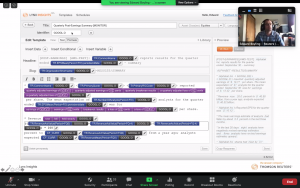
Last week IPTC did something we had never tried before: we ran a complete three-day member meeting virtually, using videoconferencing, which worked very well! Thanks to all our participants and presenters.
Spread over three days, over 50 attendees from the majority of IPTC member organisations across 16 countries heard over 20 presentations from IPTC Working Groups, IPTC member organisations and invited speakers on topics from AI-generated stock photography to tracking entities in news stories. The culmination of the event was the approval of new versions of ninjs, NewsML-G2 and Video Metadata Hub, and the (re-)election of Robert Schmidt-Nia as Chair of IPTC.
Monday: Photo Metadata, Sport and Web Publications
Monday set the tone with an introduction from IPTC Managing Director Brendan Quinn, and introductions from all attendees. Michael Steidl gave the first Working Group update as Lead of the Photo Metadata Working Group, covering the group’s wide-ranging work over the past six months including releasing the Photo Metadata Standard 2019.1 including Image Regions, plus partnership projects with Google on exposing embedded IPTC Photo Metadata fields in search results, and emerging work with camera industry association CIPA and schema.org.
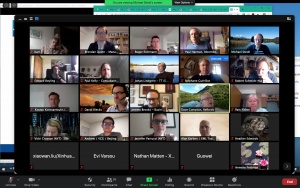
Laurent Le Meur, previous IPTC board member and currently CTO at EDRLab, gave a thought-provoking presentation on W3C Web Publications spec and how it might apply to the news publishing industry. Paul Kelly, lead of the Sports Content Working Group presented his group’s investigations into semantic modelling for sports content, looking at existing sports models and current projects investigating schema.org and semantic / linked-data modelling of sports information, which will feed in to an upcoming version of SportsML.
Tuesday: NewsML-G2, ninjs, Robojournalism, AI, Blockchain, Trust and Video
Tuesday was a busy day: we started with Dave Compton from Refinitiv, lead of the NewsML-G2 Working Group, presenting the group’s latest work including their proposal for NewsML-G2 2.29. Johan Lindgren of TT and lead of the News in JSON Working Group presented a proposal for ninjs 1.3, including many updates suggested by users and the community.
Ed Boyling of Thomson Reuters demonstrated a tool called Lynx Insights that is used by TR to generate news stories based on a rich set of rules defined by journalists. After a rule is created, an incoming news event (such as a company publishing a set of financial results) can automatically be converted to a readable story published on the wire within seconds.
Tao Chen of 500px (part of IPTC member Visual China Group) and lead of the AI Expert Group presented their latest work on AI for images, including automatic quality detection, face anonymisation, subjective feature detection (photos about “happiness” or “romance”), moving from simple face detection to age, gender and celebrity detection, automatic cutouts and more.
Angelo Marrara of ANSA and some project colleagues from EY presented their work on ANSACheck, a way of ensuring that content matches what the agency originally published using blockchain technology. The project has launched and you can see the tool embedded on ANSA’s pages.
Brendan Quinn presented IPTC’s latest work on trust and credibility in the news, including the IPTC Trust and Credibility Guidelines document draft that was published recently.
Finally, Pam Fisher of the Video Metadata Working Group presented the group’s proposal for Video Metadata Hub version 1.3, an update to clarify and simplify some points and take on some suggestions from the community.
Wednesday: NewsCodes translations, Entities, Standards Committee and IPTC Election
Wednesday started off with Jennifer Parrucci of New York Times, lead of IPTC’s NewsCodes Working Group, presenting the group’s work since the last meeting, announcing translations of the core Media Topics controlled vocabulary into Danish, Simplified Chinese and Norwegian. We now publish Media Topics in 11 languages!
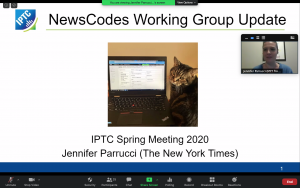
Christoffer Nilsson of new IPTC member iMatrics and Joacim Ståhl of Elysium AI (part of TT) both gave presentations on their work on extracting entities (people, places, organisations and objects) from news content, and we discussed the possibility of working as a group on an industry-wide “news entities” database.
The Spring 2020 IPTC Standards Committee Meeting was led by Stéphane Guérrilot of AFP, Chair of the Standards Committee. The first part of the meeting was a wide-ranging discussion on “how to make IPTC standards easier to use”, which will lead to some interesting projects in the next few months on documentation, marketing materials, and open source software. The second part of the meeting was the formal IPTC member vote on the proposed new standard versions: we are pleased to say that ninjs 1.3, NewsML-G2 2.29 and Video Metadata Hub 1.3 were all approved!
Finally we held a General Meeting of IPTC voting Members, during which Robert Schmidt-Nia of DATAGROUP Consulting Services was elected as IPTC Chair. We also voted through a change to IPTC’s official Articles of Association, introducing a new membership category. More on this in coming weeks!
Thanks again to everyone who made our first fully virtual member meeting such a a great success!
Day 2 of the IPTC Autumn Meeting 2019 was just as busy as Day 1: we heard from the IPTC NewsCodes Working Group, the AI Expert Group, and the News Architecture Working Group including updates on IPTC’s work on trust and credibility projects. We also had updates from the Video Metadata Working Group, an update on IPTC’s Rights work, and news from the Sports Content Working Group. Phew!
Jennifer Parrucci from the New York Times, lead of the IPTC NewsCodes Working Group, introduced IPTC NewsCodes and discussed recent progress, including cleaning up large parts of the Media Topics vocabulary. The Working Group also announced new language translations coming very soon: Portuguese and Brazilian Portuguese are ready, Chinese is almost ready, and some other language versions are in progress.
We also had an interesting and productive discussion about the workflow and process around Media Topics translations. As the team adds and retires terms and definitions, how should translations be managed? Should we not publish changes until we have translations in all languages? Or should there be a core of languages that require translations? Should we publish interim versions with un-synced changes and less frequent “stable” versions of Media Topics including all translations? We are having success using GitHub issues to manage regular changes to the taxonomy: can technology also help in managing the translation process and if so, which tools? Many ideas and thoughts were shared, including the perspectives of many member organisations who already work across multiple languages.
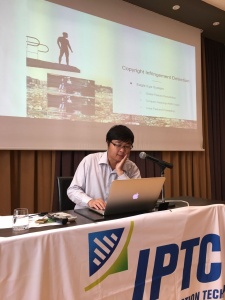
Tao Chen, VP of Machine Learning at 500px and lead of the new AI Expert Group, gave a great overview of the latest developments in AI affecting the media industry. From practical developments, like removing backgrounds from stock images, detecting copyright infringement and assessing the commercial potential of images, to the dangers of face swapping apps and a potential future of completely generated images that feature no real human beings, we learned a lot about how AI affects us today and tomorrow. We are building up the AI Expert Group to become the place where media technologists can go to learn the latest on AI and Machine Learning issues, apply the latest techniques in the media industry, and share ideas with their peers. If you’re a member and not yet involved, please talk to Tao or Brendan to get started.
Next up, Brendan Quinn spoke about IPTC’s recent work with the Journalism Trust Initiative and The Trust Project, on mapping their “trust indicators” to IPTC standards (particularly NewsML-G2) so news providers can show how they comply with trust criteria. Look out for some announcements about this work in the next few weeks. Then Dave Compton of Refinitiv, lead of the News Architecture Working Group gave an update on recent work on NewsML-G2, including the trust and credibility work, a NewsML-G2 2.28 errata release fixing some small typo errors, updates to the NewsML-G2 Guidelines and the NewsML-G2 Specification documents, work on making local extensions to Media Topics, and future work, including looking at how to represent auto-generated content, and better alignment with ninjs (see Monday’s wrap-up post for more on our recent ninjs updates).
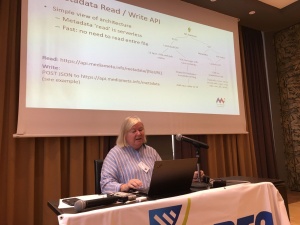
After lunch, Pam Fisher of The Media Institute at University College London spoke about her project to build a read/write API that maps metadata between various video formats. We will link to a demo as soon as it is available. Pam also discussed “compact video signatures”, part of MPEG7, which are being used to make content fingerprints for video content, used for infringement detection and content matching.
Pam’s talk was very relevant to the next discussion by Michael Steidl, lead of the Video Metadata Working Group updating on recent progress. The Working Group has been looking at new video APIs and understanding how IPTC members and others are using video metadata in their work, either with or without IPTC Video Metadata Hub.
In the afternoon Michael Steidl presented again with an update on his work with W3C’s ODRL group which impacts on RightsML. Johan Lindgren presented in lieu of Paul Kelly, new Lead of the Sports Content Working Group, giving an update on the Working Groups efforts to interview IPTC members and others about their use of sports data and to position SportsML and our work on SportsJS in the context of the news and media industry.
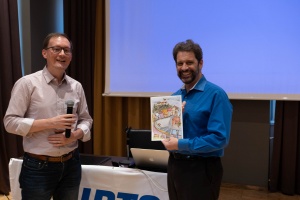
Finally we bade farewell to Stuart Myles, outgoing Chair of IPTC. We presented Stuart with a small token of our thanks for chairing the Board of Directors of IPTC since 2014, and has been involved with IPTC as a delegate since 1999! We will definitely miss his contributions, intelligence, common sense and enthusiasm, and we hope to see him involved with IPTC again in the future in some way.
Home and away teams
alignment attribute.Pre-game actions
<actions>
<action sequence-number="1" team-idref="team_9572" type="esacttype:remove" comment="Nuke"></action>
<action sequence-number="2" team-idref="team_6134" type="esacttype:remove" comment="Inferno"></action>
<action sequence-number="3" team-idref="team_9572" type="esacttype:choose" comment="Cache"></action>
<action sequence-number="4" team-idref="team_6134" type="esacttype:choose" comment="Train"></action>
<action sequence-number="5" team-idref="team_9572" type="esacttype:remove" comment="Overpass"></action>
<action sequence-number="6" team-idref="team_6134" type="esacttype:remove" comment="Dust2"></action>
<action sequence-number="7" type="esacttype:remaining" comment="Mirage"></action>
</actions>
Statistics for eSports teams, players and tournaments
scoping-label on outcome-totals in SportsML:<team-stats score="16" event-outcome="speventoutcome:win"> <outcome-totals scoping-label="T" wins="4" /> <outcome-totals scoping-label="CT" wins="12"/></team-stats><player-stats> <rating rating-value="1.11"/> <stats> <stat stat-type="esstat:kills" value="15" /> <stat stat-type="esstat:headshot" value="6" /> <stat stat-type="esstat:assist" value="4" /> <stat stat-type="esstat:flashassist" value="2" /> <stat stat-type="esstat:deaths" value="11" /> <stat stat-type="esstat:KAST" value="78.3" /> <stat stat-type="esstat:ADR" value="68.4" /> <stat stat-type="esstat:FKdiff" value="0" /> </stats></player-stats>stat construction with stat-type and value we can handle any type of statistic.esstat: and esacttype: in these examples do not currently exist in the IPTC NewsCodes catalog but could easily be set up if needed. It might be necessary to have different prefixes for different type of eSports games. But that would require some more investigation.At the IPTC Spring Meeting in Lisbon, the IPTC Standards Committee signed off on version 3.1 of SportsML.
Updates include:
round-numberattribute added tobaseEventMetadataComplexType- Added
events-discardedtooutcomeTotalsComplexTypeandresult-statustobase3StatsComplexTypeto support events where players or teams can discard some of their results. - Fixed examples to use the correct qcodes
nprt:given,nrol:shortetc for names - Corrected description of
distanceinactionAttributes
You can download the ZIP Package of SportsML 3.1 with XML Schemas and documentation included.
Development of SportsML is open to collaboration. Your feedback on the SportsML Users Forum is welcome!